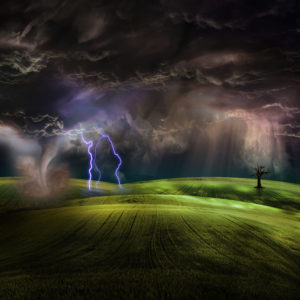
The official hurricane season may start in the summer, but there is no better time than now to start preparing your home for the strong winds, torrential rain, storm surges and other hard weather conditions that usually accompany a major storm. From hurricane-proofing your garage door to trimming the landscape, here are a few tips to help you protect your home from a storm.
We decided to enlist an expert to help cover the basics on preparing some of the major parts of your home for a storm if left to chance. Scott Fabacher, Miami-based owner of Advanced Overhead Doors & Service, will share tips to keep yourself and your garage, windows, doors and other parts of your home safe in order to avoid or limit costly damage to your home.
Garage
The first step to staying safe during the hurricane season is storm-proofing your garage door. Since the garage door is usually the largest opening in most homes, a breach has the potential to cause severe damage to your entire home. If strong winds make their way inside the garage, the pressure inside can build up to extreme levels and blow off your entire roof. A garage door breach can also damage a home’s foundation and cause water to seep in, not to mention the loss to your car and other items stored in the garage.
A wind load rated garage door that meets your area’s requirements for hurricane resilience is one of the best ways to protect your home and your family. As an additional precaution, make sure that the mounting area and track that holds the garage door in place are secure and well fitted. You may also consider installing extra reinforcements to your existing garage door.
Some insurance companies offer discounts to homeowners who have taken steps to minimize hurricane damage to their homes. Think about talking to your insurance agent way in advance, and find out what is included in your policy.
Doors and windows
If you don’t have hurricane shutters, you can use plywood sheets that are between 0.5 and 0.75 inches thick to cover large openings like windows or skylights during a storm.
For your doors, adding a third hinge or a deadbolt with a bolt throw of at least one inch can provide extra protection. If you have a set of double doors, because of the larger opening and length, consider adding header and footer bolts for reinforcement and extra support.
Roof
Since the roof of a house is bound to bear the brunt of any bad weather, you need to make sure your roof is in great shape before the first storm of the season.
If your budget doesn’t allow you to hire a professional roofing contractor for a roof inspection, the next best thing is to walk around your house, looking carefully for any signs of problems areas on the roof. Missing or cracked shingles, loose nails, and rust spots on the flashing are clear signs that you need to get some roof repairs done before the hurricane season.
Finally, make sure the rain gutters and downspouts are free of debris and tightly fastened to the main structure of your home.
Backyard
Make sure your yard is clear of any debris or loose objects such as trash cans, patio chairs or tables that can get picked up and tossed about by strong winds.
Objects that are too big to bring indoors can be securely tied down with rope or strong straps. Trees that are too close to your home can pose a huge threat during a storm and should be trimmed.
Of course, these steps do not guarantee that your home will make it through the next storm with zero damage. However, they will help you ensure that you spend far less time and money on repairs after the storm has passed.
Planning in advance makes the difference between having an extremely stressful time preparing for a storm or a more calm time, since you took the necessary steps in advance and mainly need to focus on the basics, like food, water and batteries.
It’s not easy to get motivated to do all of these things without a hurricane watch taking place, but if you can take a few minutes to pick one or two items and do a basic inspection to see what condition your roof, doors, windows or garage are in and call a professional for anything big you won’t regret it.